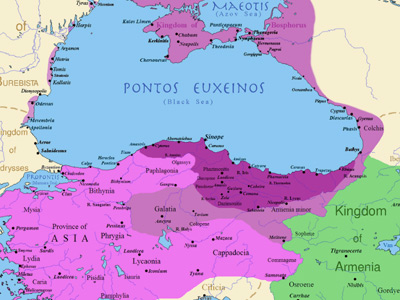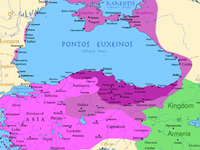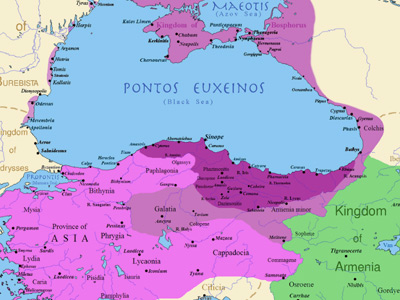Second Mithridatic War (83-81 BC)

The Second Mithridatic War (83–81 BC) was one of three wars fought between Pontus and the Roman Republic The Roman Republic was a form of government of Rome and the era of the classical Roman civilization when it was run through public representation of the Roman people. Beginning with the overthrow of the Roman Kingdom (traditionally dated to 509 BC) and ending in 27 BC with the establishment of the Roman Empire, Rome's control rapidly expanded during this period - from the city's immediate surroundings to hegemony over the entire Mediterranean world.. This war was fought between King Mithridates VI of Pontus and the Roman general Lucius Licinius Murena.
The Roman Republic was a form of government of Rome and the era of the classical Roman civilization when it was run through public representation of the Roman people. Beginning with the overthrow of the Roman Kingdom (traditionally dated to 509 BC) and ending in 27 BC with the establishment of the Roman Empire, Rome's control rapidly expanded during this period - from the city's immediate surroundings to hegemony over the entire Mediterranean world.. This war was fought between King Mithridates VI of Pontus and the Roman general Lucius Licinius Murena.
At the conclusion of the First Mithridatic War, Lucius Cornelius Sulla had come to a hasty agreement with Mithridates because he had to return to Rome to deal with a rebellion. The peace treaty allowed Mithridates to remain in control of his Kingdom of Pontus, but he had relinquish his claim to Asia Minor and respect pre-war borders. Murena, as Sulla's legate, was stationed in Asia as commander of the two legions formerly under the command of Gaius Flavius Fimbria. From Appian's work on this war (The Mithridatic Wars), we can deduce that it was put in command over Phrygia, which had been annexed to the Kingdom of Pergamon in 188 BC, and, possibly, Cappadocia, which was an ally of Rome.
Appian wrote that Murena marched across Cappadocia and attacked Comana, a town which belonged to Mithridates, because of suspicions that the latter was preparing for war against the Romans. Mithridates was fitting a fleet and raising an army to deal with a rebellion by the Colchians and the tribes around the Cimmerian Bosphorus (the Kerch Strait). It was the scale of these preparations and the fact that Mithridates had not restored the whole of Cappadocia to their king, Ariobarzanes I, who was a Roman ally, which led to this impression. Mithridates sent envoys to invoke the peace treaty. Murena replied that he did not know did see any treaties because Sulla had not written it down before he returned to Greece. He then began looting and then returned to Cappadocia to winter there. Mithridates sent enjoys to Rome to complain. In 82 BC Murena seized 400 villages which belonged to Mithridates, who did not try to counter this, preferring to wait for the return of the ambassadors. Murena returned to Phrygia and Galatia loaded with plunder. He was reached by a messenger of the senate who told him that the senate ordered him to leave Mithridates alone as he had not broken the treaty. However, he did not bring a decree and he was seen talking to Murena alone.
Murena invaded Mithridates’ territory. The latter thought that this was done under the orders of Rome and sent Gordius, his commander, to retaliate on Roman villages. Gordius seized a large number of animals and property and advanced against Murena. When Mithridates arrived there, a tough battle was fought and Murena was defeated. Murena fled to Phrygia, harassed by the enemy. This led to many states in Asia Minor which had sided with Rome to switch allegiance. Mithridates drove all the Roman garrisons out of Cappadocia. Sulla disapproved of a war against Mithridates because he had not broken the treaty. Aulus Gabinius was sent to tell Murena that the order not to fight Mithridates was to be taken seriously. Gabinius then arranged a conference with Mithridates and Ariobarzanes I to reconcile them. Mithridates betrothed his four-year-old daughter to Ariobarzanes and stipulated that Ariobarzanes was to retain the part of Cappadocia he held at the time and also have another part. Murena was recalled to Rome.
Mennon wrote that when Mithridates sent his envoys to Murena, he ignored them because they were mostly Greeks philosophers who disparaged Mithridates. He installed Ariobarzanes as king of Cappadocia and founded the city of Licinia near the border with Pontus. Meanwhile, Murena and Mithridates both sent envoys to the Heracleians to bid for their alliance. These replied that they could hardly protect themselves and could not help others. Some of Murena's advisers said that he should attack Sinope and then march on the capital of Pontus. If he seized it, other towns could be won over. Mithridates protected Sinope with a large force and prepared for war. At first he had the advantage, but then the battle was even. This blunted the two sides' appetite for war. Mithridates went further east and Murena returned to Asia.
This war was followed by the Third Mithridatic War.
HISTORY

RESOURCES
This article uses material from the Wikipedia article "Second Mithridatic War (83-81 BC)", which is released under the Creative Commons Attribution-Share-Alike License 3.0.
© Stories Preschool. All Rights Reserved.









